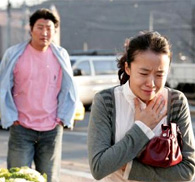In this age, gay people are constantly bombarded by exhortations from evangelical churches to see the error of their ways and seek the embrace of a Christian community as the answer to the loneliness and the stigma they feel. Many choose to give it a try. Some leave after a while, but others get trapped within and are eventually corroded by the self-hate that these churches teach. The rest of us wonder: Why would anybody want to put himself onto such a self-destructive path? What is that lure that the evangelicals lay out that is so effective in baiting new converts?

The Best Picture winner of this year's 2nd Asian Film Awards contains a hint of an answer to this question. Secret Sunshine, a Korean-made film, has nothing gay about it, but in the middle of the story, as the lead character touches the lowest depths of despondency, we see her turn to religion. The third quarter of the story, she is a changed and happier person. The last quarter of the story, she questions it all, and it's only when she does that she takes her first tentative step to real healing.
You cannot but be reminded of ex-gay ministries and how their so-called "liberation" from homosexuality is but a self-delusory facade. It is those who are the ex-ex-gays who are truly better.
Directed by Lee Chang-dong, Secret Sunshine - or Miryang in Korean - is based on a novella The Story of Insects written by Lee Chung-joon in the 1980s. It tells the story of Shin-ae (played by Jeon Do-yeon), a newly widowed mother of a young son, very closely following her perspective throughout. She takes herself and her son Jun (Seon Jung-yeop) to the small town of Miryang to start a new life after the death of her husband, and quickly discovers a friendly community as she opens her piano school.
Despite this, she doesn't quite fit in, antagonising a neighbour needlessly, and telling another neighbour, a pharmacist who tries to hand her a Christian leaflet, that sunshine is just sunshine - there is no God in it.
Meanwhile, a local car mechanic takes an interest in her, but she is not interested in a new romance. Nonetheless, Kim (played by Song Kang-ho) would stay by her side - in fact, almost stalking her - through thick and thin.
Then catastrophe strikes. Growing out of a foolish but seemingly innocuous attempt to flatter her own ego, her son is kidnapped and soon murdered. Once again, her life falls completely into pieces. She is reviled by her in-laws but more importantly, considers herself cursed: Death seems to strike anyone who comes close to her.
Once again, the pharmacist advises her to seek solace in God. At the point when Shin-ae feels she has nowhere else to turn, bereft of friends or any support, alone in a new city, and worse - suspecting herself to be the catalytic agent of wickedness around her and the cause of her own suffering - she takes her first step into a "healing" meeting out of curiosity. The warm hands that touch her, the sonorous assurances, un-dams an ocean of grief.
What follows is a whirlwind of Christian fellowship. Christianity is a high-maintenance faith, requiring frequent church services, prayer meetings, bible-study sessions and all manner of support groups, to further one's appreciation of the Word, it is said, but to an outsider, more akin to furious peddling to avoid backsliding. But she does overcome her grief, or so it seems. At last, she is accepted within a community, finding a new purpose in life.
At the same time, mechanic Kim becomes a Christian too, but you have to wonder about his motives. In so doing, you wonder how many other reasons there are for people to be Christian. Yet Kim seems genuine about his new faith, despite the ridicule of his friends.
Shin-ae's newfound peace is not to last. In a completely unexpected way, the whole edifice comes crashing down. The superiority of your faith only lasts as long as no one challenges your superiority.
To explain: It is often believed that faith is inherently superior, and being a believer is to partake of its superior goodness, thereby lifting oneself. In fact, for some people at least, it is the other way around. It is one's belief in one's superiority that lends gloss to the faith that one espouses. The moment one's superiority is undercut, the value of the faith that puffed it up in the first place is immediately called into question.
There is a difference between a faith that informs and a faith offered as a crutch.
And that is what happens to Shin-ae. When her crutch is knocked away, she comes crashing down. All her grief returns, this time compounded by a feeling that the interregnum had been a pack of lies. She flails at everything the Church represents, but nothing she does makes any difference to it. It carries on regardless, secure in its own Truth, leaving her to spiral down even deeper than when she lost her son.
As director Lee Chang-dong put it in an interview, "How do you overcome suffering? What type of meaning do you find in suffering? That's what Miryang is about."
Jeon Do-yeon gives a bravura performance, taking the film's audience through a roller coaster of emotions, most of it deeply internal. For her portrayal of Shin-ae, she won the Best Actress award at last year's Cannes Film Festival. Lee Chang-dong, who was for two years, South Korea's Minister for Culture and Tourism, won Best Director at the Asian Film Awards, and deservedly so. It's a catharsis of a movie, putting forward a huge question: What is evangelism worth?
